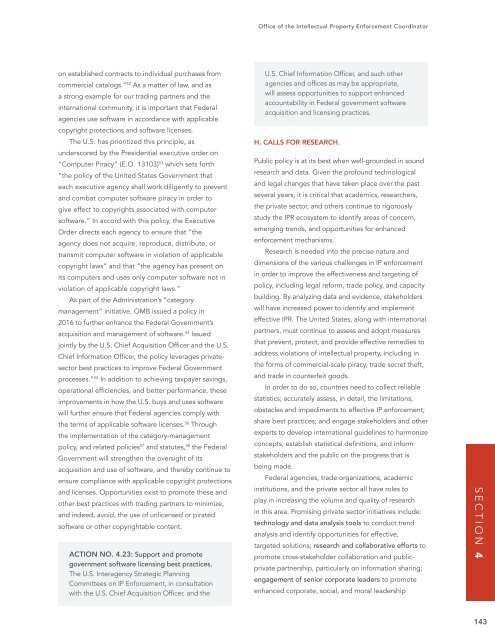ENFORCEMENT
eop_ipec_jointstrategicplan_hi-res
eop_ipec_jointstrategicplan_hi-res
Create successful ePaper yourself
Turn your PDF publications into a flip-book with our unique Google optimized e-Paper software.
Office of the Intellectual Property Enforcement Coordinator<br />
on established contracts to individual purchases from<br />
commercial catalogs.” 52 As a matter of law, and as<br />
a strong example for our trading partners and the<br />
international community, it is important that Federal<br />
agencies use software in accordance with applicable<br />
copyright protections and software licenses.<br />
The U.S. has prioritized this principle, as<br />
underscored by the Presidential executive order on<br />
“Computer Piracy” (E.O. 13103) 53 which sets forth<br />
“the policy of the United States Government that<br />
each executive agency shall work diligently to prevent<br />
and combat computer software piracy in order to<br />
give effect to copyrights associated with computer<br />
software.” In accord with this policy, the Executive<br />
Order directs each agency to ensure that “the<br />
agency does not acquire, reproduce, distribute, or<br />
transmit computer software in violation of applicable<br />
copyright laws” and that “the agency has present on<br />
its computers and uses only computer software not in<br />
violation of applicable copyright laws.”<br />
As part of the Administration’s “category<br />
management” initiative, OMB issued a policy in<br />
2016 to further enhance the Federal Government’s<br />
acquisition and management of software. 54 Issued<br />
jointly by the U.S. Chief Acquisition Officer and the U.S.<br />
Chief Information Officer, the policy leverages privatesector<br />
best practices to improve Federal Government<br />
processes.” 55 In addition to achieving taxpayer savings,<br />
operational efficiencies, and better performance, these<br />
improvements in how the U.S. buys and uses software<br />
will further ensure that Federal agencies comply with<br />
the terms of applicable software licenses. 56 Through<br />
the implementation of the category-management<br />
policy, and related policies 57 and statutes, 58 the Federal<br />
Government will strengthen the oversight of its<br />
acquisition and use of software, and thereby continue to<br />
ensure compliance with applicable copyright protections<br />
and licenses. Opportunities exist to promote these and<br />
other best practices with trading partners to minimize,<br />
and indeed, avoid, the use of unlicensed or pirated<br />
software or other copyrightable content.<br />
ACTION NO. 4.23: Support and promote<br />
government software licensing best practices.<br />
The U.S. Interagency Strategic Planning<br />
Committees on IP Enforcement, in consultation<br />
with the U.S. Chief Acquisition Officer, and the<br />
U.S. Chief Information Officer, and such other<br />
agencies and offices as may be appropriate,<br />
will assess opportunities to support enhanced<br />
accountability in Federal government software<br />
acquisition and licensing practices.<br />
H. CALLS FOR RESEARCH.<br />
Public policy is at its best when well-grounded in sound<br />
research and data. Given the profound technological<br />
and legal changes that have taken place over the past<br />
several years, it is critical that academics, researchers,<br />
the private sector, and others continue to rigorously<br />
study the IPR ecosystem to identify areas of concern,<br />
emerging trends, and opportunities for enhanced<br />
enforcement mechanisms.<br />
Research is needed into the precise nature and<br />
dimensions of the various challenges in IP enforcement<br />
in order to improve the effectiveness and targeting of<br />
policy, including legal reform, trade policy, and capacity<br />
building. By analyzing data and evidence, stakeholders<br />
will have increased power to identify and implement<br />
effective IPR. The United States, along with international<br />
partners, must continue to assess and adopt measures<br />
that prevent, protect, and provide effective remedies to<br />
address violations of intellectual property, including in<br />
the forms of commercial-scale piracy, trade secret theft,<br />
and trade in counterfeit goods.<br />
In order to do so, countries need to collect reliable<br />
statistics; accurately assess, in detail, the limitations,<br />
obstacles and impediments to effective IP enforcement;<br />
share best practices; and engage stakeholders and other<br />
experts to develop international guidelines to harmonize<br />
concepts, establish statistical definitions, and inform<br />
stakeholders and the public on the progress that is<br />
being made.<br />
Federal agencies, trade organizations, academic<br />
institutions, and the private sector all have roles to<br />
play in increasing the volume and quality of research<br />
in this area. Promising private sector initiatives include:<br />
technology and data analysis tools to conduct trend<br />
analysis and identify opportunities for effective,<br />
targeted solutions; research and collaborative efforts to<br />
promote cross-stakeholder collaboration and publicprivate<br />
partnership, particularly on information sharing;<br />
engagement of senior corporate leaders to promote<br />
enhanced corporate, social, and moral leadership<br />
SECTION 4<br />
143


